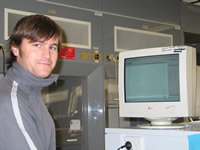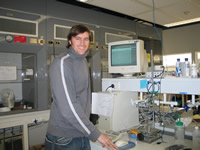|
Where did you grow up and go to school?
I am an original Tasmanian, born in Devonport and brought up in Latrobe. I attended St. Patrick's Primary School in Latrobe before attending St. Brendan-Shaw College in Devonport.
What inspired you to be a scientist?
During my time at college I was first exposed to a real laboratory. I took a keen interest in the sciences, especially chemistry and biology (where I first learnt how to catch fire to my books and dissect rats far more than necessary). I was, and still am, naturally curious as to what makes things tick. This made science much easier to understand (more so than maths) and much more enjoyable than other subjects. I also had the benefit of having superb science teachers during my years at St. Brendan-Shaw College.
One teacher in particular, Dr. Noel Minchin, was able to show to me the different applications chemistry has in our daily lives, such as how much explosive touch powder hurts when you step on it. His methods increased my interest in chemistry and were the main motivation for me to continue science after school. During my final years at college I began to look towards a career in forensic science, long before programs such as CSI were popular.
 What did you study at university as an undergraduate?
What did you study at university as an undergraduate?
I applied to study a Bachelor of Applied Science at the University of Tasmania and donned my first lab coat in 1999. I majored in chemistry where I was also studied biomedical science and statistics. During this time I learnt how chemistry has a role in everything around us; from the clothes we wear to the water we drink, not to mention how much acid is required to burn holes in your clothes. I also studied how to make cheese and wine in microbiology, as well as finding out the best ways to catch up on sleep during maths.
What type of research do you do?
After my degree, I no longer felt the desire to continue towards forensic science specifically, but was particularly interested in research where I could tackle a project using my knowledge and discover new and exciting aspects of science. One of my lecturers was relatively new (by Tasmanian standards) and had originally been employed at the University of Wollongong researching electrically conducting polymers (plastics). I had never heard of plastics that conduct electricity before and was intrigued. I found out that the first conducting plastic was discovered in the 1980s by accident and since then this field of research has grown exponentially. I began an extra year of Honours after my three-year Bachelor course studying one conducting plastic, polyaniline, and preparing extremely small fibres of polyaniline with everyday plastics such as PVC. If you were to take an average human hair and cut it up between 100 to 200 times you would have some idea of the scale of these fibres I was producing.
I thoroughly enjoyed my 4th year at university and applied to continue on by studying a PhD in the same field, albeit in far more depth. During this time I have travelled to conferences and other universities, met with other researchers and met a Nobel Prize winner in Chemistry, as well as doing some work occasionally.
 What will you do after your PhD?
What will you do after your PhD?
Whilst the past 7� have been demanding I can finally see an end to my work as a university student. I am currently writing (or stressing over) my thesis and have begun to
apply for jobs within the Australian Public Service and I also have the
opportunity to continue my research both within Australia and overseas. The benefit of having a degree in science is the skills you learn can be applied to a wide array of different scenarios, and learning science does not necessarily mean a career in science.
What do you love about science?
What I love about science the most is how it describes the way the world works. How our life, both physical and in general, depends on hundreds of thousands of different processes that occur everyday, and how these link together in one way or another with the way we live. I as said before I like to know what makes things tick. Looking at it from this way scientists are the ultimate clock workers, understanding how the cogs work together and how to make the clock run better.
|
